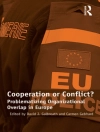Which ingredients of a cooperative community project most help it succeed? What are urban commons and how do they fit into current activist and civil society debates? And what tools and methods do commoners need to strengthen their work? These are the three questions at the heart of The Urban Commons Cookbook, a handbook for those interested in starting, growing and supporting community-led projects.
This book represents a first attempt to bridge the gaps between individual ur...
สารบัญ
- Forewords
- Introduction
- Why do urban commons need a cookbook?
- Urban commons in theory and practice
- What are urban commons?
- Why now? Commons...
เกี่ยวกับผู้แต่ง
Nicole de Vries works in the field of public participation and sustainable (urban) development.
ซื้อ eBook เล่มนี้และรับฟรีอีก 1 เล่ม!
ภาษา อังกฤษ ● รูป EPUB ● หน้า 194 ● ISBN 9783000651946 ● สำนักพิมพ์ Mary Dellenbaugh-Losse ● การตีพิมพ์ 2020 ● ฉบับ 1 ● ที่สามารถดาวน์โหลดได้ 24 เดือน ● เงินตรา EUR ● ID 7814440 ● ป้องกันการคัดลอก Adobe DRM
ต้องใช้เครื่องอ่านหนังสืออิเล็กทรอนิกส์ที่มีความสามารถ DRM












